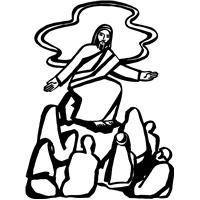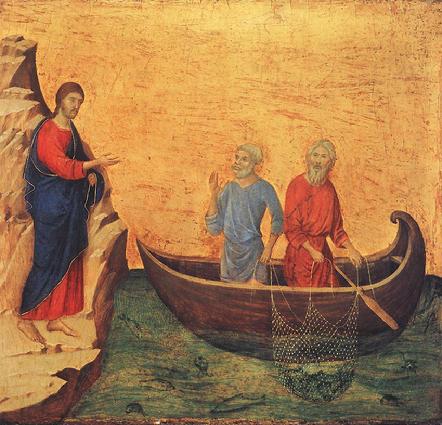They would gather twice a year around a conference table, confer, and at the end of a couple of days, reach some conclusions, and, incidentally, have a banquet.
First, they did a book reporting out the results of their findings of what Jesus really said, what sounded very much like he would’ve said it, what could be giving a sense of what he might’ve meant, and some stuff he probably just didn’t say at all.
And then they published a second book similarly asking did he really do this? – and they came to some astonishing conclusions:
“There are certain pieces of narrative information that probably reflect historical actuality and among them are the following:
“Jesus was an itinerant teacher in Galilee. Jesus proclaimed the kingdom of God. Jesus cured some sick people. Jesus drove out what were thought to be demons. Jesus enjoyed a certain amount of popularity in Galilee and surrounding regions.
These observations are almost certainly historical.”
“Historical? Outrageous! – that this is an actual person instead of a comforting myth, or more to the point, it was comforting if it were a myth, but if it’s true, historically true, then you have to take this person seriously.
What he did and what he said matters deeply, and Jesus can change your life. Jesus can change your life, personally, and as a church, and as a society and as a world. And you know what? He already has. And he is doing it now. We get to choose to follow him.
In the workings of that scholars’ group they expressed various levels of confidence in the authenticity of the words of the Bible as they have come down to us. Some words, some language, they were pretty sure came down to us direct, others carried the gist, some the general idea, and some - not so much. Among the words that sound a lot like Jesus, in which they had much confidence as conveying Jesus’ message, were these:
3. Congratulations to the poor in spirit!
Heaven’s domain belongs to them.
4. Congratulations to those who grieve!
They will be consoled.
6. Congratulations to those who hunger and thirst for justice!
They will have a feast.
I am reminded of the words of the prophet Isaiah (25:6-9), depicting the gathering at the end of time.
On this mountain the Lord of hosts will make for all peoples
a feast of rich food, a feast of well-matured wines,
of rich food filled with marrow, of well-matured wines strained clear.
And he will destroy on this mountain
the shroud that is cast over all peoples,
the sheet that is spread over all nations;
he will swallow up death for ever.
Then the Lord God will wipe away the tears from all faces,
and the disgrace of his people he will take away from all the earth,
for the Lord has spoken.
It will be said on that day,
Lo, this is our God; we have waited for him, so that he might save us.
This is the Lord for whom we have waited;
let us be glad and rejoice in his salvation.
They will have a feast. Not because of what you might expect. What they experienced, what they felt, including grief and disconsolation, is a common human condition, part of life as we know it, alongside other happier feelings and experiences. These are not things we seek but they are things we know.
And somehow even that has a blessing in it.
Some of the sayings that pretty much get the point across are these:
10. Congratulations to those who have suffered persecution for the sake of justice! Heaven’s domain belongs to them.
11. Congratulations to you when they denounce you and persecute you and spread malicious gossip about you because of me. 12. Rejoice and be glad! Your compensation is great in heaven. Recall that this is how they persecuted the prophets who preceded you.
Congratulations?! Is this what it means to follow Jesus? Did we sign up to be prophets? Did we sign up for this burden? Or like grace, does it just come? Having taken on the good news and the joy of Jesus, have we also found in the packages under the Christmas tree something a little more formidable, the joy that is found in the midst of suffering for the sake of the gospel?
As we follow Jesus, we are under the wings of the Holy. These things will come. But with them will come the kingdom of God. And this is a promise.
Not long ago I saw a play about a small group of people in an isolated community who shared a common, if strictly limited faith, and therefore a common, if strictly limited, attitude toward life.
Into their community comes a free spirit, a refugee from another life, someone who brings a different sense of the joy of life and of the possibilities of life to them despite her own long-standing grief …
The name of the story is “Babette’s Feast", and as a result of the sumptuous Feast that Babette prepares for the people of the small community, they begin to embrace Joy and Grace a little more warmly than they have before.
As they gather and share the meal they talk and reconcile; old grudges drop away as love emerges.
They begin to embrace joy, and grace, a little more warmly than they have before – in fact, a lot more warmly, so that it is as if for an hour, they’ve had a glimpse of heaven.
a feast of rich food, a feast of well-matured wines,
of rich food filled with marrow, of well-matured wines strained clear.
In the midst of this story, which I watched as a play recently, I recalled the reflection “church is church,“ as I was watching the members of the close little community bicker with each other, and then at the end, when they embraced each other, and reached a moment of grace together, I said to myself again “church is church”.
That is, both the good and the bad, the happiness and the bickering, and the possibility of the release of mercy based on God‘s own infinite mercy— are church.
Actually, that’s the explicit point made by one of the characters: we are surrounded by God’s infinite mercy. Let’s open our hearts to it. The feast helped.
The phrase “church is church“ I heard in a group of ministers in a class in about 2010 where a black church musician and pastor name Royce Shorter was listening to people from very different faith backgrounds to his own talk about what was going on in their congregations and how they were feeling about it and he said somewhat to his surprise “church is church.”
We all have these experiences, as pastors, as church members, as people of God.
We have a lot of the same ways of being with each other, the ways we behave, in the way we treat each other and feel about each other, in the congregation, regardless of denomination. In fact, I remember “Church is Church” when I have spoken with Sufi leaders and Sikh leaders, as well as Christians of my own and other denominations.
Church is church, and we embrace the grace as well as the grit of life together.
Living into the kingdom - a phrase you may have heard - means living as if Jesus is real, as if what he said is true, and compelling, and may re-order the whole of life. In fact, that is what we want to happen. And that is why we are here today.
We Arizona clergy just had our annual retreat - mostly about “how are you guys coping with pandemic stress?” - and the congregations I'm involved in, here and in Tucson, are having annual meetings this weekend. Some can say 'steady as she goes' while others need to have real come-to-Jesus conversations. There are substantial issues to discuss. It’s worth sticking around.
And while we are doing that we can keep in mind last week’s closing question: What does it mean to follow Jesus? We got some answers in the Gospel this morning, and in the reading from the prophet Micah. Indeed, one Tucson congregation has adopted as its slogan for today “Do justice, love mercy, and walk humbly with our God.”
What will that mean for us going forward? This congregation, this church, each of us? Let’s pray about it, let’s talk about it, let’s let the Spirit lead us. Keep the faith. In joy.
Robert S. Jones: Exodus, Moses, Law. Requirements. || Mt5 Beatitudes, New Law: Blessings.
Steve Springer: Hymn 560. The Hymnal 1982. New York: Church Publishing.
Robert W. Funk and the Jesus Seminar. The Acts of Jesus: The Search for the Authentic Deeds of Jesus. A Polebridge Press Book. New York: HarperCollins.1998.170.
Robert W. Funk, Roy W. Hoover, and the Jesus Seminar. The Five Gospels: The Search for the Authentic Words of Jesus. A Polebridge Press Book. New York: Macmillan. 1993. 138-139.
http://www.lectionarypage.net/YearA_RCL/Epiphany/AEpi4_RCL.html
http://edgeofenclosure.org/epiphany4a.html
“Blessed are” (Joan Baez) https://www.youtube.com/watch?v=etLe3UcptCk

